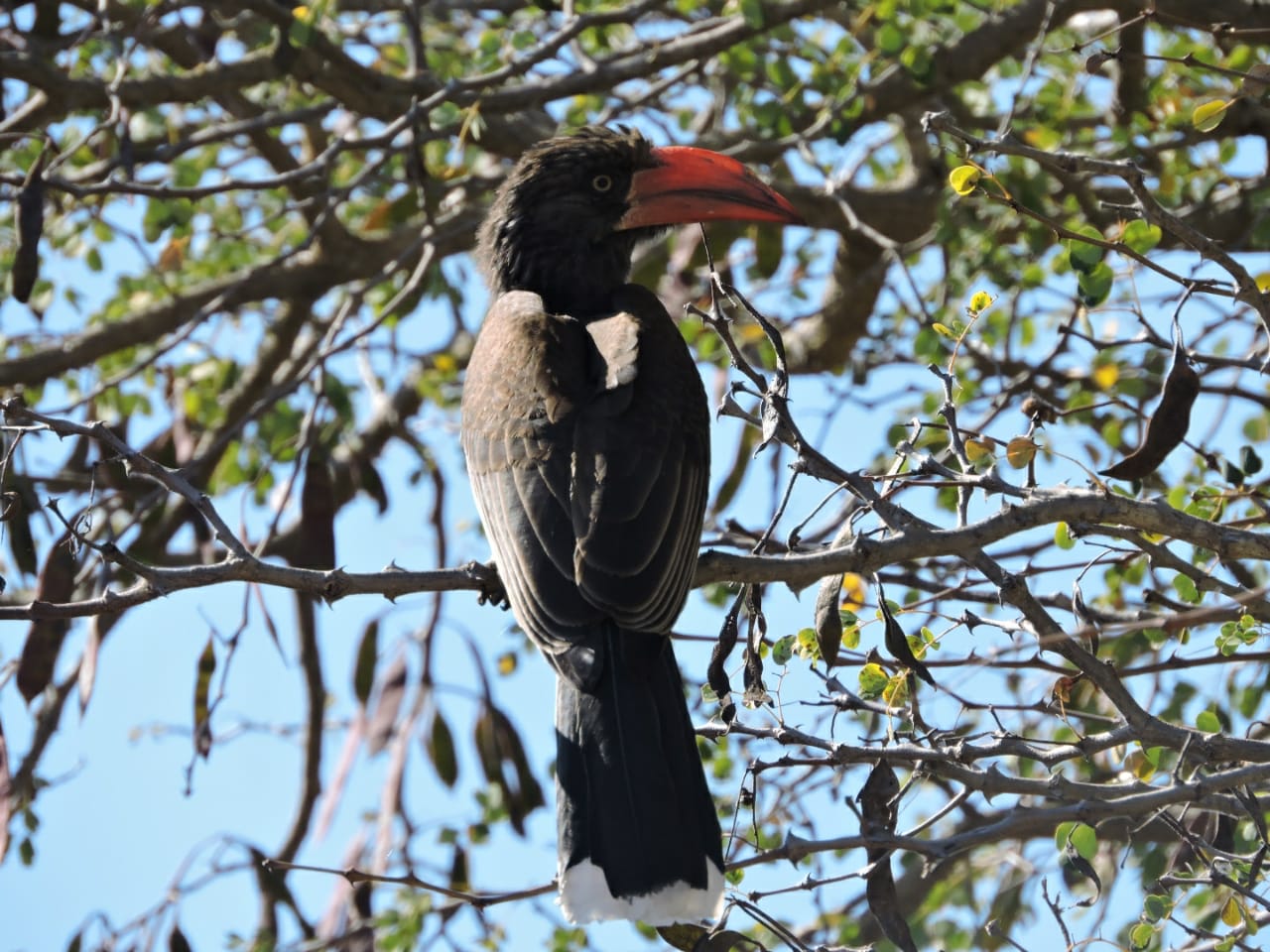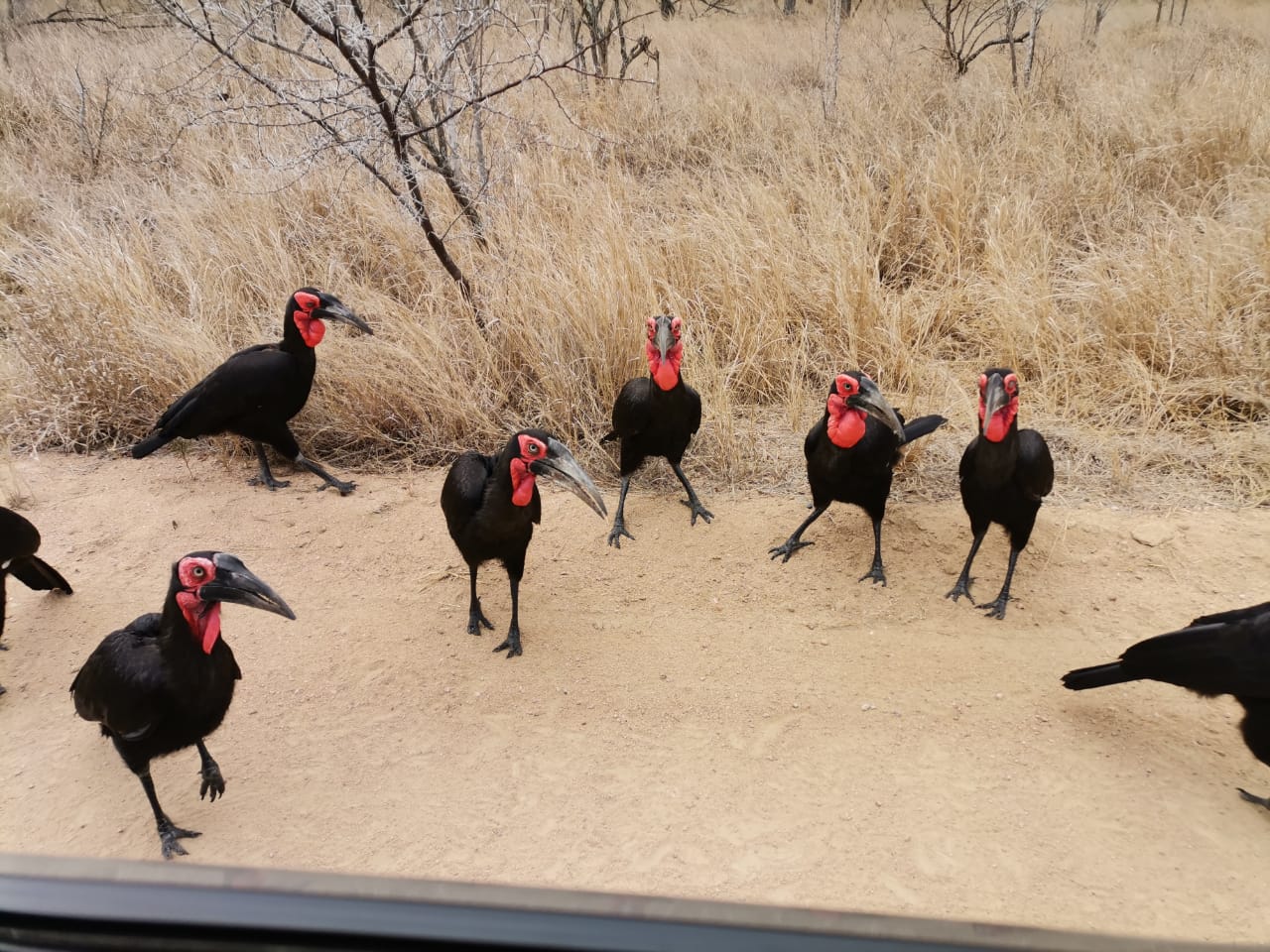Hornbill - Bird of the Month: November 2012
- Richprins
- Committee Member
- Posts: 76089
- Joined: Sat May 19, 2012 3:52 pm
- Location: NELSPRUIT
- Contact:
Re: Hornbill - Bird of the Month: November 2012
In this video one can hear the deep duet of ground hornbills in the background, plus the normal yellow-billed! 
Please check Needs Attention pre-booking: https://africawild-forum.com/viewtopic.php?f=322&t=596
- Lisbeth
- Site Admin
- Posts: 67563
- Joined: Sat May 19, 2012 12:31 pm
- Country: Switzerland
- Location: Lugano
- Contact:
Re: Hornbill - Bird of the Month: November 2012
Looks like a boiled egg 
"Education is the most powerful weapon which you can use to change the world." Nelson Mandela
The desire for equality must never exceed the demands of knowledge
The desire for equality must never exceed the demands of knowledge
- Richprins
- Committee Member
- Posts: 76089
- Joined: Sat May 19, 2012 3:52 pm
- Location: NELSPRUIT
- Contact:
Re: Hornbill - Bird of the Month: November 2012
Please check Needs Attention pre-booking: https://africawild-forum.com/viewtopic.php?f=322&t=596
-
Klipspringer
- Global Moderator
- Posts: 5862
- Joined: Sat Sep 14, 2013 12:34 pm
- Country: Germany
- Contact:
Re: Hornbill - Bird of the Month: November 2012
Hornbills are monogamous and live with their single partner till their death. Hornbills have however distinct love stories, as there are two types of monogamy.
The following article sheds some light on this:
The following article sheds some light on this:
Genetic monogamy in Von der Decken’s and Northern Red-billed hornbills
Margaret F. Kinnaird1 and Timothy G. O’Brien
Introduction
Avian monogamy has been a topic of interest
for many decades (Lack 1968). However,
only recently has social monogamy been distinguished
from genetic monogamy. Social
monogamy (85% of bird species) is defined
as an exclusive living arrangement involving a
pair bond between a male and female, often
characterized by cooperation in resource acquisition
and parental care (Bennett and Owens
2002). Genetic monogamy is defined as an
exclusive pair bond accompanied by exclusive
parentage or fidelity (Gowaty 1996, Reichard
2003). Social and genetic monogamy are not
always equivalent; on average, 12.5% of offspring
of socially monogamous species result
from extra-pair copulations (Bennett and Owen
2002).
Asian hornbill species exhibit four monogamous
social systems including nomadic pairs,
part-time territorial pairs, year-round territorial
pairs, and territorial family groups (Kinnaird and
O’Brien 2007). Among African hornbills, savanna
species including ground-hornbills (Bucorvus
spp.) and Tockus hornbills (Tockus spp.) are
the best studied (Kemp 1995). Ground-hornbills
are cooperative breeders on large territories
and savanna Tockus hornbills are monogamous
pairs on part-time or year-round territories.
[...]
In this paper, we report on the results of a paternity
analysis of chicks of two African savanna
hornbill species, Von der Decken’s hornbill (T.
deckeni) and Northern Red-billed hornbill (T.
erythrorhynchus) in northern Kenya.
[...]
Results
We monitored 10 Northern red-billed hornbill
(NRBH) successful nesting events in 2012
(n = 2), 2013 (n = 3), and 2015 (n = 5) involving
nine females and 19 chicks, and captured
four young juvenile birds with putative fathers
in walk-in traps. For Von der Decken’s hornbills
(VDDH), we monitored 27 successful nesting
events in 2012 (n = 2), 2013 (n = 9), 2014 (n = 6)
and 2015 (n = 10) involving 26 females and 40
chicks, and 11 capture events involving young
juveniles traveling with an adult. For chicks
banded and bled at the nest site, we had 100%
assignment of social father to genetic father for
both species. For four cases of juvenile NRBH
captured with an associated adult male, in all
cases, the adult male was the genetic father.
For 11 cases of juvenile VDDH captured with
an associated adult male, in 10 of 11 cases, the
male was identified as the genetic father.
Discussion
Our results extend the finding of genetic monogamy
in Montiero’s hornbill (Stanbeck et al.
2002) to two additional Tockus species, Northern
red-billed and Von der Decken’s hornbills.
Tockus hornbills exhibit several characteristics
of long-term monogamy including year-long
associations, territoriality, courtship feeding
and sperm storage. Mulder et al. (1994) argued
that any tendency toward extra pair copulations
in birds would be a compromise between
females seeking genetically superior males and
her dependence on male provisioning during
nesting. Gowaty (1996) also believed that the
female should always seek a genetically superior
male and that socially bonded males should
attempt to restrict access to females through
mate guarding or other constraints. Gowaty
believed that the threat of withholding food
from females was sufficient to constrain her,
since female Tockus hornbills generally molt tail
and wing feathers during incubation and are
unable to fly, and male desertion would doom
the female and her chicks. Such conflict-mediated
reproductive strategies assume that costs
incurred are tolerable for (at least) one sex and
that one sex gains at a cost to the other (Mock
and Forbes 1992).
Stanback et al. (2002) note that mate guarding
is not particularly strong in Montiero’s hornbills
and Finnie (2012) found the same in Southern
yellow-billed hornbills (T. leucomelas). This
loose guarding, combined with sperm storage,
allows for the possibility of extra-pair copulations
prior to entering the nest. Purple Sandpipers
(Calidris maritima) are long-lived, socially
monogamous sandpipers also characterized
by strong mate and territory fidelity, high male
parental investment and loose mate guarding,
that rarely seek extra-pair copulations (Pierce
and Lifjeld 1998). Both Stanback et al (2002)
and Pierce and Lifjeld (1998) argue that, when
male paternal investment is high, the females
have little to gain from extra-pair copulations
and should resist extra-pair copulations, making
male attempts energetically expensive.
Stanback et al. (2002) also argue that the complete
dependence of female and chicks on
male provisioning results in a strong overlap in
reproductive interests of males and females, resulting
in cooperation rather than conflict.
For seven females (NRBH = 1 and VDDH = 6)
that nested at least twice during our study, we
found that the same male was the father after
two to four years, indicating extended pair
bonds in both Tockus species. Based on the
observation of extended pair bonds in hornbills,
overlap in reproductive interest, and high
male parental investment, we agreed with Stanback
et al. (2002) that mate choice by females
is based on provisioning skills rather than phenotypically
expressed genetic superiority (Kinnaird
and O’Brien, 2008). Females should try
to retain a good male provider. Since male provision
is equal to female reproductive success,
and inferior male providers will either kill the
female and chicks or force the female to abandon
the chicks, females should only engage
with untested males under three conditions; a
female mating for the first time, a female who
has abandoned an inferior male provider, or a
female who has lost a mate. Females abandoning
inferior males may be a common feature
in monogamous systems with extended pair
bonds where females use paternal investment
as a signal of male quality.
A distinction between our ideas and those of
Stanback et al. (2002) is the order of events in
the development of monogamy in hornbills.
Stanback et al. (2002) assume that nest-sealing
evolved as an anti-predator behavior which in
turn led to long-term sperm storage, high male
investment, and cooperation over conflict. We
argue that if nest sealing was an effective anti-
predator behavior, it should have evolved
more often among cavity nesters (Kinnaird and
O’Brien, 2008). Although hornbills have higher
nesting success than other cavity nesting species,
the result is not significantly different. We
believe that female nest sealing evolved as a
female strategy to ensure the cooperation of
the male.
Our study strengthens the argument that Tockus
hornbills are genetically monogamous as
well as socially monogamous. It also leads us
to question whether the pattern of genetic monogamy
will hold for Asian hornbills and the
forest hornbills of Africa. Given the increasing
use of nest boxes to augment hornbill nesting,
there is a greater opportunity to test for paternity
within other hornbill genera.
- Richprins
- Committee Member
- Posts: 76089
- Joined: Sat May 19, 2012 3:52 pm
- Location: NELSPRUIT
- Contact:
Re: Hornbill - Bird of the Month: November 2012
Please check Needs Attention pre-booking: https://africawild-forum.com/viewtopic.php?f=322&t=596
- Richprins
- Committee Member
- Posts: 76089
- Joined: Sat May 19, 2012 3:52 pm
- Location: NELSPRUIT
- Contact:
Re: Hornbill - Bird of the Month: November 2012

Kruger Sightings
@LatestKruger
10:15 am
1 Crowned Hornbill stationary
Seen at Paul Kruger Gate
Near Skukuza
5/5
Tinged by Karman
(Photo)
Please check Needs Attention pre-booking: https://africawild-forum.com/viewtopic.php?f=322&t=596
- Peter Betts
- Posts: 3084
- Joined: Fri Jun 01, 2012 9:28 am
- Country: RSA
- Contact:
Re: Hornbill - Bird of the Month: November 2012
The common Hornbill in the Eastern Cape ..but in Kruger only found around Skukuza and Punda Maria
-
Klipspringer
- Global Moderator
- Posts: 5862
- Joined: Sat Sep 14, 2013 12:34 pm
- Country: Germany
- Contact:
- Lisbeth
- Site Admin
- Posts: 67563
- Joined: Sat May 19, 2012 12:31 pm
- Country: Switzerland
- Location: Lugano
- Contact:
Re: Hornbill - Bird of the Month: November 2012
Funny how different the calls are 
"Education is the most powerful weapon which you can use to change the world." Nelson Mandela
The desire for equality must never exceed the demands of knowledge
The desire for equality must never exceed the demands of knowledge
- Richprins
- Committee Member
- Posts: 76089
- Joined: Sat May 19, 2012 3:52 pm
- Location: NELSPRUIT
- Contact:
Re: Hornbill - Bird of the Month: November 2012
Beggars! 

Kruger Sightings
@LatestKruger
·
19h
1:40pm
8 Southern Ground-hornbill on the move
S26, 3km E of S114
Near Skukuza
5/5
Tinged by Katy Opperman

Kruger Sightings
@LatestKruger
·
19h
1:40pm
8 Southern Ground-hornbill on the move
S26, 3km E of S114
Near Skukuza
5/5
Tinged by Katy Opperman
Please check Needs Attention pre-booking: https://africawild-forum.com/viewtopic.php?f=322&t=596


